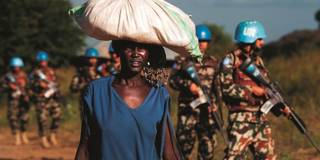While the need for international peacekeeping today is great, the current approach is not fit for purpose, owing to a variety of geopolitical and historical factors. The situation demands reforms and new thinking at all levels of governance, from global bodies down to the boots on the ground.
MONROVIA – As violent conflicts grow in volume and intensity, the global peacekeeping paradigm is being called into question, not least in Africa. According to the Africa Center for Strategic Studies, conflicts across 16 countries have displaced more than 40 million people. That figure is larger than the populations of Angola, Ghana, or Morocco, and double what it was in 2016.

MONROVIA – As violent conflicts grow in volume and intensity, the global peacekeeping paradigm is being called into question, not least in Africa. According to the Africa Center for Strategic Studies, conflicts across 16 countries have displaced more than 40 million people. That figure is larger than the populations of Angola, Ghana, or Morocco, and double what it was in 2016.